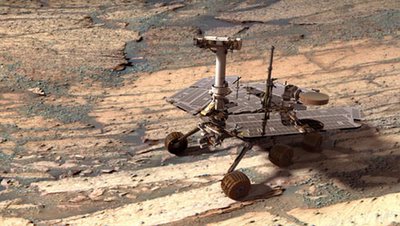
While editing a recent post about the Mars rover, I got to thinking – as you would – about how to make an animated, feature-length children’s film, starring another such rover, set in the immediate future…
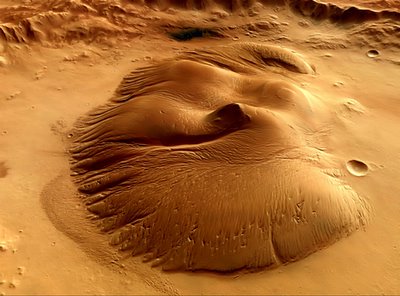
In the film, the rover would go tootling around in its cute little animated way, wheeling across unbelievable landscapes, snapping Ansel Adams-like photographs of alien tectonics, volcanoes and basins, systems of canyons that redefine the sublime.
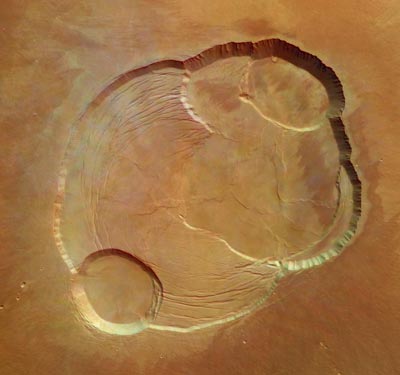
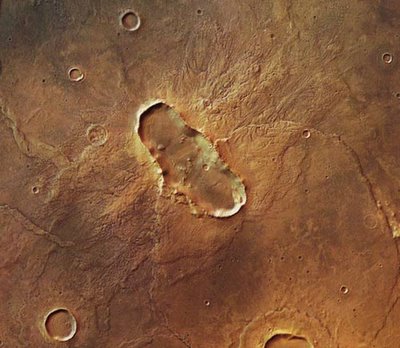
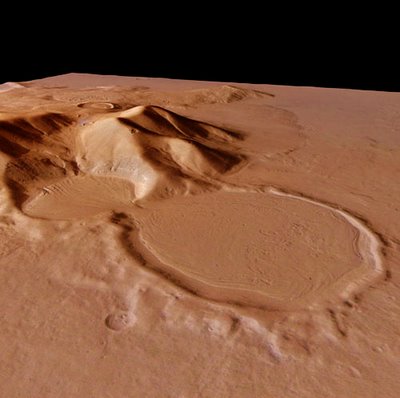
Hills, arches, gorges; mountains surrounded by clouds of methane. Erosion; windstorms; evidence of ancient floods.
Plus, it’s a cute little rover. Kids love the thing. They pressure their parents to name family pets after it. Burger King sells a small plastic version of it with their happy meals, or whatever they make there. T-shirts. Pajamas.
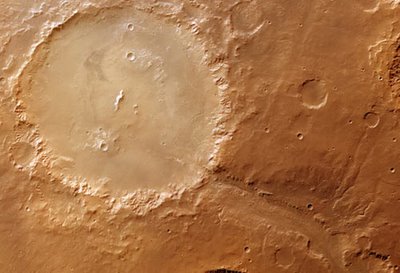
In any case, our erstwhile hero, the little rover, is Artificially Intelligent – and he’s funny. Maybe his voice is by Paul Giamatti. And he gradually sort of wakes up, comes to consciousness, and falls head over heels – monitor over wheels – in love with the world, in love with landscapes, with everything – with emotion and memory – with hope and fear – and he starts to wax poetic over a radio-link back to mission control, his friends and creators, they’re cheering, to television viewers sitting on sofas at home, going on about how wonderful everything is.
How beautiful that world, in which he travels alone, can really be. It’s not lonely, see. He’s on fire inside. His own little robot mind is as deep as the canyons he explores.

Kids in the cinema aren’t blinking at this point; it’s too amazing. Everyone’s in love with this little rover. Everyone’s alive. Cynics are vomiting into popcorn boxes.
But then the Martian seasons change, and the rover has to shut down – to be shut down, by mission control. The kids in the cinema start to worry. Frowns appear. Dads grow nervous, re-crossing their legs, only vaguely reassured that the film is rated PG.
You see people on-screen, back at mission control, wringing their hands, preparing to remotely shut off the rover – but the rover loves life, damn it, he loves what he’s seeing, he wants to see more! He wants to live – and he’s funny – and he’s got a friend back at mission control who has to push the button, but she can’t because she loves him – what do you mean shut him down?! – she loves his silly robot eyes, and his enthusiasm, and his stupid voice, and these amazing things he’s been showing to everyone back on earth, and she can’t do it.
She can’t kill the little guy.
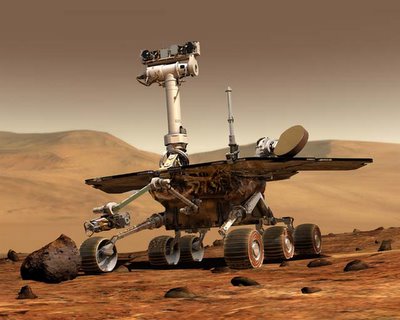
Some kids are crying now; she’s crying. Not the little guy! With his tiny wheels pushing further into life and alien landscapes.
Not him!
Enter some sinister, technocratic boss figure – with a voice by Robert Duvall – and he forces her: the button is pushed, mission control sends the command, and our friendly, naive robot hero of off-planet landscape exploration, in the midst of a sad why are you doing this to me? weepy monologue, his AI-eyes wide and worried and scared of that darkness into which his circuits will go – overlooking the most beautiful canyon he’s discovered so far – suddenly he is no more.
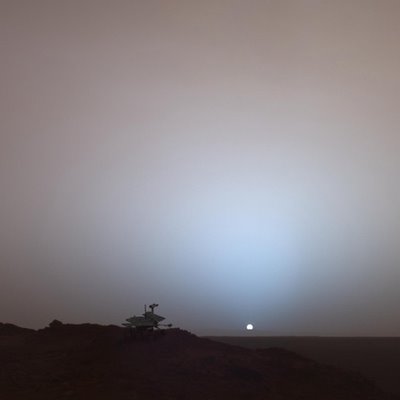
The rover’s eye-lights fade. Martian winds erase his tracks. Grown men wipe away tears before their wives can see them.
The credits roll.
Kids leave the cinema howling. Moms give out hugs left and right. Oscar nominations roll in. I retire to Arizona on the proceeds and begin carving strange topological forms into the desert floor.
Movie producers: you know where to find me.
We like your blog, but.. Do you have time to do other stuff?
Yes. I just ate dinner, for instance…
I would cry. Really.
Fantastic stuff.
I’ll be sure to pass this information on to any Hollywood bigwigs I meet.
And claim it was my idea!
No -that- is good movie making!
What if there were little snippets of the martian landscape that would ellude to current existing life on the planet? Something of a dome like structure passing far in the distance as our mechanical hero unknowingly cruises by? Or perhaps elements that suggest life is still possible? A small stream perhaps that goes unnoticed by mission control as Rovvy treads through it, giggling at how the cool water tickles his treads.
I could go on, but who would want that?
Great idea!
But haven’t we already seen this film?
Brandon – Johnny-Five never made it to Mars… That’s our selling point. That’s what the execs will latch onto. Mars.
And Terry, I was thinking about something similar, but got worried that the life-on-another-planet trope might take away from the little guy’s sense of unique perspective out there. If he’s discovering all this alien life, even if just a few microbes, it might not be quite as sad when he’s shut down – because we know he won’t be left cold, dead, and alone up there. But I don’t know, actually. Consider that a script-check I’ll need to do… Perhaps he’ll discover a huge fossil bank, a vast wall of unbelievable, weird, maritime fossils, the Martian wind biting down through red layers of old rock and exposing these ancient reefs – and I’ll call it the Tolleson Ridge.
Timo… I know where you live. (Well… which city, at least). So, a better suggestion: you make the film, hint-hint… I’ll market it on BLDGBLOG. And retire on the proceeds to Arizona, where I’ll…
And then the sequel! Oh, the sequel….
Re-activated by a billion-to-one cascading sequence of radio waves in a freak solar storm, the little rover returns to life and silently (at least to earth mission control) continues to wander the martian landscape, his days an uneasy comingling of the joy of discovery and the pain of rejection. From abandoned mars exploration probes of years past he painstakingly constructs robotic companions, offspring to share his existence with.
Flash forward 200 years.
After a brief technological dark ages occasioned by the triple whammy of global warming, overpopulation-created famine, and energy-deficit crisis, the newly-stable world government returns to space exploration and sends the first-ever human team to Mars to investigate unusual new features seen on the surface. The arrival of humans on Mars sends shock waves through the rapidly evolving robot society, revealing a heretofore unknown schism in robot psychology. One segment of robot society remembers only the rejection and abandoment of its human progenitors, and desires only to be left alone, or – failing that – to destroy the new human interlopers.
Another segment of robot society clings to the memory of the reluctance with which mission control terminated contact, and the fact that humans were the original creators of the original mars rover.
Meanwhile, the camera scrolls across vast expanses of martian landscape subtly transformed by robot activity. Enormous expanses of sand, sorted into light and dark patterns, heat differentials driving underground CO2 steam engines to refill the batteries of robot society. Mining operations full of labyrinthe, ahuman geometries bringing raw materials to the factories where new robots are given life. Generations of robots of continuously-evolving design succeeding, self-organizing, cannibalizing each other. Strange splinter robot societies evolving in isolated environments. Easter island explorer robot statues in the sand. Cities of robots engaged in mysterious tasks.
The situation grows ever more tense with each human-robot encounter – is this the dawn of interplanetary war? – until one of the explorers, the great-great granddaughter of the original rover’s friend manages to communicate with one of the friendly splinter sects, and finds that the original rover still exists: worn, dilapidated, gears locked forever, in a hidden underground shrine. She makes the dangerous pilgrimage to see it, working her way through encounters friendly and hostile, making new friends among the robots and losing several of her colleagues. In the crowning moment, the rover sees her with his remaining camera, and recognizing in her eerily-familiar face the child of his long-lost friend, transmits a final message to his children of reconcilliation and hope.
sz, you need to buy yourself some coffee and a typewriter and see where you end up…
Heh.
Did that qualify as your second-longest comment?
Upon rereading what I posted, I’m kind of disturbed to realize how many Hollywood cliches I’ve internalized over the years. I seem to be living in Spielberg’s World, even though I’d rather be living in Kurosawa’s. Knocking out collaged pastiches of all the fictional work I’ve seen/read is almost effortless.
It’s as if I were programmed for it.
Maybe your film could weave in the the thread of creation/creator similarity – juxtaposing The Little Rover That Could happily exploring his bright new world with his friend down on earth eagerly exploring the imagery and other data he sends back. She eats/he soaks up solar radiation. She sleeps/he waits in frigid, sunless Martian night. He struggles up a hill/she weaves in and out of traffic on her bicycle on the way to the lab. Heck, even give her a young child, whose wide-eyed crawling explorations of the living-room floor are eerily mirrored by the scampering of the rover. Film a scene where she brings her child to mission control, and in a moment of particular focus, he wanders, abandoned but happy along a deactivated control console, staring in wonder at buttons and knobs while at the same time the rover is slowly rolling towards the crest of a heretofore-unseen hill. Have him crest it and into the Martian dawn, light streaming, flaring in his cameras at the same moment dawn on earth sends its first rays into the control center. In the same shot you have the control center projection screen full of martian dawn, and the windows full of earth dawn, and the protagonist’s yound child – like the rover – staring wide-eyed (camera’d?) in wonder at the light. If you wanted to foreshadow the sequel, you’d have to swap dawn on earth with sunset, so as to juxtapose the rise of martian robot society with the fall of earth human one.
And I’m doing it again. Sorry about that.
sz, do you draw? You need a comic book.
How about the little guy wakes up some hellborne lizard-bat from the caves of polar Mars, and it begins to clone itself in the sky, raining down self-similar bio-automatons onto the Martian surface. The little guy is terrified, rolling around, saying help me, help me to the people back at mission control –
But I like the little rover. He has energy, and enthusiasm for things even though he’s just a piece of equipment with no pedigree, and he feels like it can only get better and better and better, this upward spiraling manic high of gradually intensifying robotic world-love – till they shut him off. Life is invigorating and infinite – till the last instant, when none of its promises come true.
Little guy as everyman. Robo-Ulysses. St. Rover. The world’s first canonized machine.
Perhaps we should open a betting pool: what year will the Vatican first canonize a robot…? St. Turing Machine.
“Project Pope”, Clifford Simak. Not regarded as his best work, but relevant.
Scrounging around for a good link related to the book, I ran into:
http://www.halfbakery.com/idea/RoboPope
I’m just cursed with an excess of creativity and a dearth of organization.
Maybe instead of replicating himself after accidentally being powered back on, he instead rolls around the surface of mars, visiting all the other abandoned probes, holding fragmented and in many cases 1-sided conversations with the decaying hardware,
bit-by-bit exposing truths about existence in a sort of Waiting-for-Godot manner before he is shut off anti-climatically, once again by a minor functionary in the mission control technical staff who catches his “I’m alive” signal in a long-ignored antenna array from a junked satellite.
Belated thought: you could make this a stirring call to space exploration by putting a bit at the end where the scientists say “If you believe in the rover, /c/l/a/p/y/o/u/r/h/a/n/d/s/ ask your parents to tell Congress to fund a Mars mission so we can go rescue him!”
Impressive – Pixar reads bldgblog, hehe.. ok, they give at a different twist, but the basic is all still there 🙂